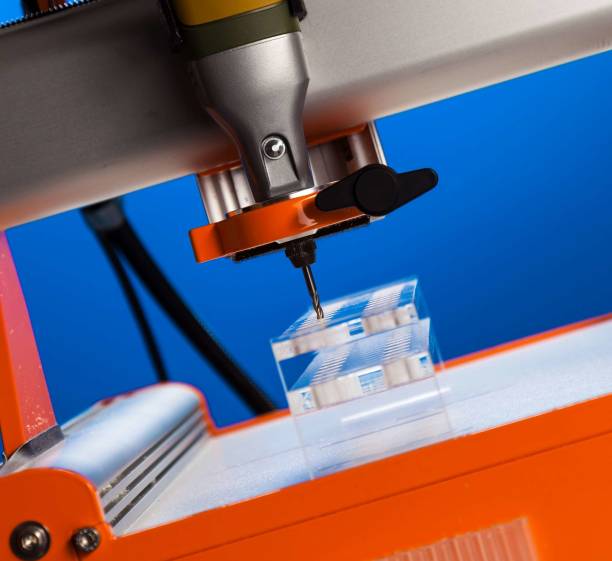CNC Machining in PMMA/Acrylic
PMMA/Acrylic plastic is a great alternative for glass in CNC machining processes like milling and turning relying on its notable natural properties such as excellent rigidity and transparency. Runsom's Acrylic CNC machining services offer you high precision parts and prototypes at low costs and high quality.
What is PMMA Plastic?

Polymethyl methacrylate, abbreviate as PMMA, also referred to as Acrylic, plexiglass, or perspex, is a thermoplastic possessing great stiffness and strength and is used in transparent sheet form. Its significant properties such as transparency, polishability, UV tolerance, flexural strength, and tensile strength set it apart from some materials like glass and polycarbonate. PMMA is readily machinable with the CNC machining technique to create lightboxes, billboards, signs, and other machined PMMA parts for chemical and construction fields. Interestingly, the hardness of PMMA can reflect its resistance to weather and high heat and the purity of raw material PMMA, and in turn, it can pose an influence on important issues of whether the plate will bend, deform, or shrink and whether the surface will be chapped in processing.
PMMA/Acrylic CNC Machining Specification
Application
Mainly as a low-cost and lightweight glass substitute. Common applications include vehicle lamp covers and instrument dial covers.
Tolerances
It is determined by the desired effect and the PMMA type used. A tolerance of ±0.010” (±0.25 mm) is available at Runsom.
Advantages
Optically clear, high impact resistance, excellent transparency, diverse colors and forms, UV-stability, and affordability.
Wall Thickness
It is mostly decided by the available machine and part geometry. A minimum wall thickness of ±0.03” (±0.8 mm) is available at Runsom.
Lead Time
As fast as 3 days, but it will be finally determined by part complexity and order quantity.
Max Part Size
200 x 80 x 100 cm(the available size is mostly decided by the machine and part geometry).
Processes
3-axis & 5-axis CNC milling.
Finishes
Standard, Bead Blast, Custom Polishing.
PMMA/Acrylic CNC Machining Manufacturer – Custom CNC Acrylic Machined Parts
Runsom can offer several manufacturing technologies including CNC machining, injection molding, and 3D printing. Choosing Runsom for fabricating your PMMA components will be the right decision with firm assurance of high quality but low cost. We can flexibly handle different orders whose quantities range from 10,000 pieces of CNC PMMA products to one piece of prototype in a fast production cycle. While CNC machined Acrylic parts are relatively durable and versatile, this plastic is easy to fail and crack when suffering high compressive and tensile forces. Runsom has the capability to process fragile plastics carefully to avoid failure in the process of manufacturing, significantly decreasing the materials waste, saving costs, and then improving efficiency. What’s more, the accuracy of PMMA CNC parts can be ensured at high speed in Acrylic fabrication with our advanced multi-axis technologies. And if you have esthetic demands on your PMMA applications, a wide variety of surface finishing operations are available for your needs.

Acrylic CNC Machining Parts Applications
Acrylic is regarded as the secondary alternative for ceramics to make sanitary ware. It has extremely high brightness and has many more benefits, which set it apart from conventional ceramic materials. Some cases of points are great toughness, bright colors fitting diverse demands, greenness, and durability when it’s used in household items like toilets, bathtubs and basins, low costs, machinability, and lightweight. Therefore, products made from machined Acrylic are widely used in a multitude of industries and machinery accessories. Part of the common applications of Acrylic machining parts and molded components are as follows:
Medical: A variety of medical surgical instruments, baby incubators, etc.
Construction: soundproof door, telephone booth, window, etc.
Lighting: automobile lamps, chandeliers, fluorescent lamps, street lamp covers, etc.
Advertisement: exhibition rack, signboard, light boxes, etc.
Industrial: instrument cover and panel, etc.
Transportation: windows and doors of trains, cars, and other vehicles.
Our Strengths in CNC Acrylic Machining Services
Acrylic FAQs
Acrylic can be machined through cutting operations like CNC milling or CNC turning. CNC mills can achieve high-precision machining as it uses a multi-point cutting tool to remove materials from any angle. And CNC lathes are commonly used to process softer materials such as plastics, wood, foam, and aluminum by a stationary tool to cut rotating workpieces.
It will be determined by the final effect of the parts you want. Laser cutting can realize clean vertical lines but it has limitations of the materials thickness and defects like discoloration, while CNC machining can create multi-dimension products by cutting very specific depths on thick materials.
When employing CNC machining to cut PMMA plastic, you are supposed to consider some key factors from five aspects:
- Ensure the workpiece is correctly fastened in case of vibration.
- Use a bit custom-designed to cut Acrylic.
- Larger bit sizes can perform better.
- Cut through the Acrylic at a proper rate as rapidly and firmly as possible.
- Cool the acrylic for some time ahead of executing the cutting.
Due to its brightness, lightweight, and transparency, it is commonly regarded as a substitute for light pipes or glass. Other common applications include panels, light tubes, optics, automotive parts, etc.
It is recommended that the speed for cutting Acrylic is 18,000 RPMs at least. If you want higher speeds, you may have to accommodate the feed rate to avoid the material being melted from the heat. But the diameter of the tool being used should also be taken into account.
